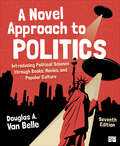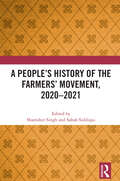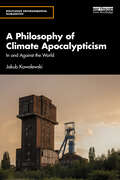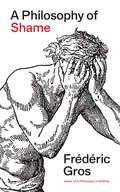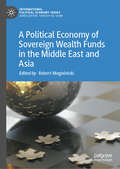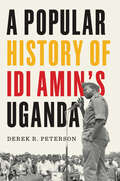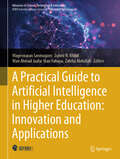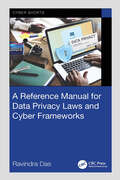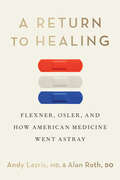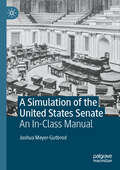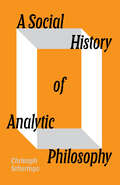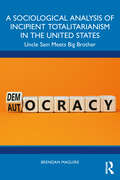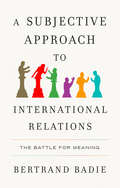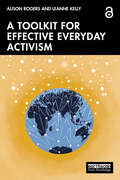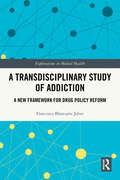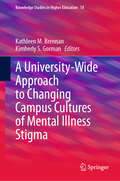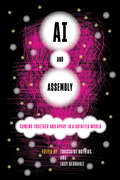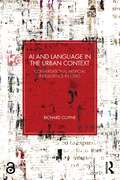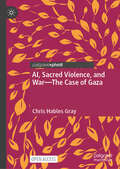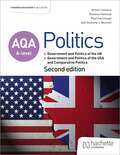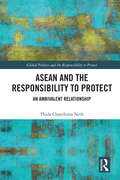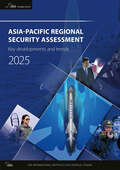- Table View
- List View
A Novel Approach to Politics: Introducing Political Science through Books, Movies, and Popular Culture
by Douglas A. Van BelleA textbook your students will want to read. "If you would like students to understand hard political concepts, this work makes it accessible for them. By using pop culture, we can open ideological ideas and students are not bound by their own preconceived ideas." —Leah Murray, Weber State University A Novel Approach to Politics turns the conventional textbook wisdom on its head by using pop culture references to illustrate key concepts and cover recent political events. Adopters of previous editions are thanking author Douglas A. Van Belle for some of their best student evaluations to date. With this Seventh Edition, Van Belle brings the book fully up-to-date with recent events, current policy debates, international happenings, and other assorted political matters. Understanding politics requires a willingness to engage with ideas, arguments, and information that makes you uncomfortable, Van Belle takes the most tumultuous political periods in recent history head-on. Somehow, he weaves in recent movies and books into the text as he works in a solid foundation in institutions, ideology, and economics controversies into all that sizzle, which is certain to captivate students. Included with this title: LMS Cartridge: Import this title′s instructor resources into your school’s learning management system (LMS) and save time. Don′t use an LMS? You can still access all of the same online resources for this title via the password-protected Instructor Resource Site. Select the Resources tab on this page to learn more.
A People's History of the Farmers' Movement, 2020–2021
by Sabah Siddiqui Shamsher SinghIn the annals of India’s history, a monumental uprising unfolded in 2020, echoing the resilience and coming together of large sections of its agrarian base. Instigated by the contentious farm laws of 2020, the Farmers’ Movement burgeoned into a year-long saga of protest and perseverance, ending only in December 2021 after the passing of the Farm Laws Repeal Bill, 2021 by the Indian Parliament. From the initial demand for law repeal to the multifaceted growth of the movement, the book traces the journey of the Farmers’ Movement, as each essay dissects the socio-political dynamics, cultural nuances, and mass solidarity that underpinned the protests, including focused analyses from Delhi, Punjab, Haryana, Uttar Pradesh, Rajasthan, Maharashtra, and the Sikh diaspora in the United Kingdom. This anthology chronicles the ebb and flow of a nation’s spirit, encapsulating the symbiotic relationship between theory and praxis, between change and continuity. It serves as a testament to the power of collective resistance and a roadmap for future struggles, ensuring that the legacy of the Farmers’ Movement endures beyond the pages of history.This volume is an interdisciplinary project and will be of interest to scholars from diverse fields such as economics, sociology, public policy, political science, history, political geography, gender studies, cultural studies, international studies, architecture, media studies, psychology, and ethnomusicology.
A Philosopher Looks at Clothes (A Philosopher Looks At)
by Kate MoranClothes are much more than just what we put on in the morning. They express our identity; they can be an independent statement or the result of coercion; and they have deeply entrenched historical, political, and social aspects. Kate Moran explores the connections between clothes and philosophy, showing how clothes can illustrate and pose philosophical problems, and how philosophical ideas influence clothing. She discusses what it might mean for an article of clothing to be beautiful; how we communicate with clothes; how we use clothes to navigate our social existence; and how our social existence leaves its mark on our clothes. She also considers the curious relationship between philosophers and children's clothes, legal restrictions on clothing, textile waste, and labor conditions of textile workers. Her absorbing and engaging portrait of our clothes helps us to understand an important and underexplored aspect of our lives.
A Philosophy of Climate Apocalypticism: In and Against the World (Routledge Environmental Humanities)
by Jakub KowalewskiThis book offers a long-overdue analysis of the ubiquity of eco-apocalypticism in current discourses on the climate crisis.Drawing on a wide range of sources and theoretical traditions from ecological works and radical pamphlets, through political theology and continental philosophy to ancient and medieval apocalypses, the book sheds a comprehensive light on the concepts, processes, and experiences which circulate around the figure of the environmental end of the world. Importantly, this book argues that apocalypticism can provide a productive philosophical framework for addressing the climate catastrophe, enabling us to propose a distinctive answer to the fundamental question which haunts progressive ecological projects: how can we defend the world we find indefensible?Appealing to students, academics, and researchers in philosophy, political theology, and environmental humanities, this book is a timely intervention which hopes to demonstrate that, when all else fails, it is the end of the world which may save the planet.
A Philosophy of Shame: A Revolutionary Emotion
by Frédéric GrosAn original reflection on shame as the central feeling of our age — the expression of an anger that is the necessary condition for new strugglesCan shame become a source of political strength? Faced with injustice, growing inequality and systemic violence, we cry out in shame. We feel ashamed of obscene wealth amid wider deprivation. We feel ashamed of humanity for its ruthless and relentless exploitation of the earth. We feel ashamed of the racism and sexism that permeate society and our everyday lives.This difficult emotion is not just sadness or a withdrawal into oneself, nor is it a paralysing sense of inadequacy. As Frédéric Gros argues in A Philosophy of Shame, it arises when our perception of reality rejects passivity and resignation and instead embraces imagination. Shame thus becomes the expression of an anger that is a powerful, transformative force —one that assumes a radical character.In dialogue with authors such as Primo Levi, Annie Ernaux, Virginie Despentes and James Baldwin, Gros explores a concept that is still little understood in its anthropological, moral, psychological and political depths. Shame is a revolutionary sentiment because it lies at the foundation of any path of subjective recognition, transformation and struggle.
A Political Economy of Sovereign Wealth Funds in the Middle East and Asia (International Political Economy Series)
by Robert MogielnickiThis book on sovereign wealth funds (SWFs) in the Middle East and Asia brings together leading scholars and practitioners focusing on investment trends in two prominent and influential regions of the globe. The resulting political economy mapping of these investment vehicles breaks new ground in elucidating prominent geographic contours of the global SWF sector. The interregional framing likewise reveals the strategic economic significance of SWF-facilitated linkages between the Middle East and Asia. The work probes three cross-cutting themes. The initial chapters explore the dynamics of competition and collaboration amongst Middle Eastern and Asian SWFs. This book then turns to the energy, environmental, and sustainability issues shaping SWF investment behavior. Finally, country-specific chapters examine how and why SWF investments materialize within key markets. These interregional connections enabled by sovereign wealth represent an expanding economic frontier with long-term implications for the Middle East, Asia, and the global economy.
A Popular History of Idi Amin's Uganda
by Derek R. PetersonHow Africa’s most notorious tyrant made his oppressive regime seem both necessary and patriotic Idi Amin ruled Uganda between 1971 and 1979, inflicting tremendous violence on the people of the country. How did Amin’s regime survive for eight calamitous years? Drawing on recently uncovered archival material, Derek Peterson reconstructs the political logic of the era, focusing on the ordinary people—civil servants, curators and artists, businesspeople, patriots—who invested their energy and resources in making the government work. Peterson reveals how Amin (1928–2003) led ordinary people to see themselves as front-line soldiers in a global war against imperialism and colonial oppression. They worked tirelessly to ensure that government institutions kept functioning, even as resources dried up and political violence became pervasive. In this case study of how principled, talented, and patriotic people sacrificed themselves in service to a dictator, Peterson provides lessons for our own time.
A Practical Guide to Artificial Intelligence in Higher Education: Innovation and Applications (Advances in Science, Technology & Innovation)
by Mageswaran Sanmugam Zuheir N. Khlaif Wan Ahmad Jaafar Wan Yahaya Zaleha AbdullahThis book explains how educators can use artificial intelligence in education to enhance student engagement and improve learning outcomes by sharing best practices for using AI to enhance learning quality and foster sustainable teaching. This book covers various topics related to the use of AI in education, from designing activities to using AI in teaching to using AI in assessment by following the ethical considerations of using AI in teaching. The book not only discusses the related topics to using AI in education, but also presents best practices of using AI in teaching and learning from different countries and provides best practices of ethical considerations based on lives experiences of the authors. Furthermore, the book introduces the teaching methods of integrating AI in teaching and learning. Therefore, this book offers essential information and a practical guide to using AI in education.
A Reference Manual for Data Privacy Laws and Cyber Frameworks (Cyber Shorts)
by Ravindra DasAs the world is becoming more digital and entwined together, the cybersecurity threat landscape has no doubt become a daunting one. For example, typical threat variants of the past, especially those of phishing, have now become much more sophisticated and covert in nature. A lot of this has been brought on by the proliferation of ransomware, which exploded during the COVID-19 pandemic. Now, there is another concern that is looming on the horizon: data privacy. Now, more than ever, consumers on a global basis want to know exactly what is happening to their personal identifiable information (PII) datasets. Examples of what they want to know about include the following: What kinds and types of information and data are being collected about them How those PII datasets are being stored, processed, and transacted with How their PII datasets are being used by third-party suppliers In response to these concerns and fears, as well as the cyber risks posed by these datasets, many nations around the world have set up rather extensive and very detailed data privacy laws. In their respective tenets and provisions, these pieces of legislation not only specify why and how businesses need to comply with them, but also outline the rights that are afforded to each and every consumer. In this book, we detail the tenets and provisions of three key data privacy laws: The GDPR The CCPA The CMMC We also provide a general framework at the end on how a business can comply with these various data privacy laws.The book begins with an in-depth overview of the importance of data and datasets, and how they are so relevant to the data privacy laws just mentioned.
A Return to Healing: Flexner, Osler, and How American Medicine Went Astray
by Andy Lazris Alan RothDrawing from their extensive experience in primary care and backed by decades of academic research, primary care physicians Andy Lazris, MD, and Alan Roth, DO, unravel the complexities of the modern health care system in A Return to Healing. Through a wealth of patient stories and meticulous research, they dig into the roots of American health care challenges and seek its cure. Utilizing poignant patient narratives and rigorous analysis, Lazris and Roth expose the flaws in our modern approach to health care. The book dissects the current philosophy of medical care, addressing foundational issues in health care infrastructure, the pitfalls of screening, the dishonesty of the pharmaceutical industry, and a lack of common sense among health care providers. By exploring common diseases and medical scenarios, demonstrating how doctors arrive at their conclusions, and focusing on the perverse incentives and outdated training that drive doctors to rely on protocols and numerical-based care, Lazris and Roth demonstrate what is wrong with the system and reveal how to fix it. Advocating for patient empowerment, the book offers a road map for reform that is accessible to patients and policymakers alike. This solution-oriented approach aims to dismantle barriers to patient-centred care and foster informed decision-making. In this compelling critique and call to action, A Return to Healing provides a clear path towards a more equitable and effective health care system.
A Simulation of the United States Senate: An In-Class Manual
by Joshua Meyer-GutbrodThis book serves as a manual for students enrolled in semester-long US Senate simulations. The simulation tasks students with representing a particular state while inheriting a particular Senator’s voting history. Students then engage with their peers to write, introduce, mark up, debate, and adopt legislation, within an environment where the instructional staff play the key roles of the House of Representatives, the President, the Press, and public interest groups. The manual and simulation experience are designed to supplement classes on Congress and the Presidency and the political process. Building on the innovation of experiential learning opportunities, this book facilitates the connection of complex theoretical concepts to real-world applications through student reflection.
A Social History of Analytic Philosophy
by Christoph SchuringaHow a supposedly apolitical form of philosophy owes its continuing power to social and political forcesAnalytic philosophy is the leading form of philosophy in the English-speaking world. What explains its continued success? Christoph Schuringa argues that its enduring power can only be understood by examining its social history. Analytic philosophy tends to think of itself as concerned with eternal questions, transcending the changing scenes of history. It thinks of itself as apolitical. This book, however, convincingly shows that the opposite is true.The origins of analytic philosophy are in a set of distinct movements, shaped by high-ly specific sets of political and social forces. Only after the Second World War were these disparate, often dynamic movements joined together to make &‘analytic philosophy&’ as we know it. In the climate of McCarthyism, analytic philosophy was robbed of political force.To this day, analytic philosophy is the ideology of the status quo. It may seem arcane and largely removed from the real world, but it is a crucial component in upholding liberalism, through its central role in elite educational institutions. As Schuringa concludes, the apparently increasing friendliness of analytic philosophers to rival approaches in philosophy should be understood as a form of colonization; thanks to its hegemonic status, it reformats all it touches in service of its own imperatives, going so far as to colonize decolonial efforts in the discipline.
A Sociological Analysis of Incipient Totalitarianism in the United States: Uncle Sam Meets Big Brother
by Brendan MaguireUsing George Orwell’s novel Nineteen Eighty-Four as a guide for interpreting the role of the American state in the twenty-first century – paying particular attention to how the government responded to the life and death issues of terrorism, COVID-19, and climate change – this book presents eye-opening and compelling documentary evidence that suggests Orwellian policies have already been implemented by Republicans and Democrats.A Sociological Analysis of Incipient Totalitarianism in the United States advances a groundbreaking sociological explanation for how totalitarian rule is embraced by the public when freedom, equality, and justice are compromised, offering a sociological explanation of how totalitarian rule is operationalized from the macro level to the micro level, using concepts associated with Marx (ruling ideas), Mead (generalized other) and Berger and Luckmann (recipe knowledge) which are especially key to understanding the process. Finally, the book suggests policies that could halt and reverse the progression of totalitarianism in the United States.Scholarly and yet readily accessible to a general readership, this book showcases the sociological importance and enduring influence of Orwell – working as a supplement to Orwell’s Nineteen Eighty-Four and making a meaningful contribution to the public discourse by challenging and informing students and the public about the very real fears of creeping totalitarianism in the United States.
A Subjective Approach to International Relations: The Battle for Meaning
by Bertrand BadieChina’s growing power and Russia’s invasion of Ukraine have thrust geopolitics back to the centre of the global stage, but the old geopolitical frameworks, with their positivist methods and their emphasis on structural determinants, will not enable us to understand the increasingly dangerous world in which we are living today. Bertrand Badie argues that states and the many other actors now operating in the international arena are products of their cultural contexts and political traditions. Their perspectives and motivations are shaped by the narratives, memories and emotions that constitute people’s everyday realities; they are therefore profoundly subjective in character and cannot be reduced to the categories of behaviour posited by traditional geopolitical frameworks like realist IR theory. In Badie’s view, international disputes in the twenty-first century are better understood through the concept of the ‘battle for meaning’, confrontations between different modes of understanding the world. His judgement is that peace and stability depend on greater sensitivity to the worldview and international perspective of other actors in the international arena. A willingness to try to see the world from the subjective perspective of one’s friends, rivals and even one’s enemies is vital. This timely and engaging book by one of the world’s leading scholars of international relations will be of great interest to students and scholars in politics and IR and to anyone concerned about the growing tensions in the world today.
A Toolkit for Effective Everyday Activism
by Alison Rogers Leanne KellyThis book examines how everyday activists can enhance their effectiveness.Leanne Kelly and Alison Rogers unpack theories from the social sciences to help find meaning, explain these feelings of inertia, and provide strategies to overcome them. Through lessons learned over their careers as evaluators in non-profit organisations, Kelly and Rogers provide tools and strategies for measuring, improving, and sharing the effectiveness of planet-saving activities. They draw upon interviews with everyday people who are contributing to change in their homes, community groups, workplaces, and social settings to understand how they motivate and encourage others. The book concludes with a realistic look at individual expectations and focuses on how to prioritise self-care to ensure that activists can keep contributing in a way that maintains their wellbeing and balance.A Toolkit for Effective Everyday Activism empowers people to use theory, research, and practical tools to leverage their power so they can make the maximum contribution possible and sustain their efforts over the long term. It will be a great resource for individuals working and volunteering in community groups, NGOs, and non-profit and corporate organisations with an environmental focus.The Open Access version of this book, available at http://www. taylorfrancis.com, has been made available under a Creative Commons Attribution-Non Commercial-No Derivatives (CC-BY-NC-ND) 4.0 international license.The electronic version of this book was funded to publish Open Access through Taylor & Francis’ Pledge to Open, a collaborative funding open access books initiative. The full list of pledging institutions can be found on the Taylor & Francis Pledge to Open webpage
A Transdisciplinary Study of Addiction: A New Framework for Drug Policy Reform (Explorations in Mental Health)
by Francisco Blancarte JaberUsing novel, bioethical framing alongside critical and comprehensive analysis of harm reduction approaches, this cutting-edge book addresses the multifaceted and transdisciplinary issue of drug addiction in society, exploring how addiction can be conceptualized from various disciplinary perspectives for positive policy outcomes.The book discusses the philosophical concepts of agency and action within addiction, and how this can support the foundations needed to identify the most effective and ethical harm reduction strategies within policy frameworks. Foregrounding the implications for this notion of agency, chapters trace the evolution of the concept of addiction through the centuries and examine contemporary understandings from neuroscience, philosophy, bioethics, and policy analysis. Comparative, case study analysis is conducted to contrast local, empirically based models for drug policy in the United Kingdom alongside external models based on international treaties, which dictate a top-down approach to drug penalization.Offering a research-based and theoretically informed framework for effective harm reduction strategies and policies, this book will be of interest to scholars, researchers, and postgraduate students in the fields of addiction studies, bioethics, and mental health policy more broadly. Policymakers working in addictions and substance use may also find the book relevant.
A University-Wide Approach to Changing Campus Cultures of Mental Illness Stigma (Knowledge Studies in Higher Education #18)
by Kathleen M. Brennan Kimberly S. GormanThis interdisciplinary volume addresses the progress made regarding mental illness stigma in the realm of higher education while acknowledging how stigma has transformed to present more subtle challenges in this context and how it may be addressed to promote positive campus outcomes. Written by researchers and practitioners who representdifferent fields within higher education, it highlights the existence of stigma by focusing on its presence in the curriculum, in policies, and in processes within the university. It discusses both the presence and impact of stigma in undergraduate and graduate studies, athletics, and faculty and staff. The book emphasizes a collaborative approach to involve stakeholder groups across campus by providing practical, preemptive solutions to reduce stigma. This volume can be used as a practical guide for any institution of higher educationwishing to address mental illness stigma on their campus in a strategic, systemic manner. Additionally,it will be helpful for individuals working in higher education as a guide for reflecting on and changing their individual practice.This book greatly appeals to those who are interested in addressing mental illness stigma systemically.
AI and Assembly: Coming Together and Apart in a Datafied World
by Toussaint Nothias and Lucy BernholzArtificial intelligence has moved from the lab into everyday life and is now seemingly everywhere. As AI creeps into every aspect of our lives, the data grab required to power AI also expands. People worldwide are tracked, analyzed, and influenced, whether on or off their screens, inside their homes or outside in public, still or in transit, alone or together. What does this mean for our ability to assemble with others for collective action, including protesting, holding community meetings and organizing rallies ? In this context, where and how does assembly take place, and who participates by choice and who by coercion? AI and Assembly explores these questions and offers global perspectives on the present and future of assembly in a world taken over by AI. The contributors analyze how AI threatens free assembly by clustering people without consent, amplifying social biases, and empowering authoritarian surveillance. But they also explore new forms of associational life that emerge in response to these harms, from communities in the US conducting algorithmic audits to human rights activists in East Africa calling for biometric data protection and rideshare drivers in London advocating for fair pay. Ultimately, AI and Assembly is a rallying cry for those committed to a digital future beyond the narrow horizon of corporate extraction and state surveillance.
AI and Language in the Urban Context: Conversational Artificial Intelligence in Cities
by Richard CoyneIn a world influenced increasingly by artificial intelligence (AI), the city emerges as a dynamic hub of digital conversations. AI and Language in the Urban Context offers a novel exploration of how AI, particularly large language models (LLMs), is transforming urban environments. Moving beyond the typical technological narratives, this book draws on the author’s unique expertise in design, semiotics and hermeneutics to present a critical cultural perspective on AI’s role in the city.Focusing on the intersection of urban theory and AI, the book reveals how conversational AI is reshaping social interactions, decision-making processes, and media in urban spaces. By merging practical knowledge of AI algorithms with an understanding of urban practices, the author highlights the opportunities and challenges AI presents for modern cities.This book is essential for anyone interested in the future of urban living. It provides a deep dive into the technical, social and cultural implications of AI in cities, offering practical examples and philosophical insights. Readers will gain a comprehensive understanding of how AI is influencing the design, governance and dynamics of urban life in the digital age.The Open Access version of this book, available at www.taylorfrancis.com, has been made available under a Creative Commons [Attribution-Non Commercial-No Derivatives (CC-BY-NC-ND) 4.0 license.
AI, Sacred Violence, and War—The Case of Gaza
by Chris Hables GrayThis open access book is about how Israel is using Algorithmic Intelligence (AI) and other computer technology in military operations in the Gaza Strip to achieve goals based on ancient religious entitlements. Changes in Israel Defense Force (IDF) ethical codes and innovation policies have not led to victory, but have resulted in a wide range of War Crimes and Crimes Against Humanity in a strategy focused on The Torture of Gaza, which includes ethnic cleansing and is approaching genocide. It covers the history of using AI in war, and current U.S. and Israeli military AI technologies such as Maven, Iron Dome, Pegasus, the Alchemist, Gospel, Lavender, and Where’s Daddy, all tested and perfected in the Palestinian Laboratory and marketed as such. This book also places the current data-driven and AI-directed assault on Palestine in the context of Postmodern War, which precludes military victories and enshrines the profits and power of the U.S.-Israeli military-industrial complex in a system of perpetual war and militarized technological innovation. Through an analysis of Israeli military policies, AI, sacred texts, and the basic tenets of postmodern war, the book ultimately reveals the limits of the IDF’s embrace of illusions about new technologies producing actual victory. War today is about winning hearts and minds, not body counts. As fundamentalist politics achieve more and more power around the world in the context of new information technologies, there is growing danger to the future of all of us.
AP U.S. Government and Politics Premium, Sixteenth Edition: Prep Book with 6 Practice Tests + Comprehensive Review + Online Practice (Barron's AP Prep)
by Curt Lader M.S. Ed. Barron's Educational SeriesBe prepared for exam day with Barron&’s. Trusted content from AP experts! Barron&’s AP U.S. Government and Politics Premium, Sixteenth Edition includes in‑depth content review and online practice. It&’s the only book you&’ll need to be prepared for exam day. Written by Experienced Educators Learn from Barron&’s‑‑all content is written and reviewed by AP experts Build your understanding with comprehensive review tailored to the most recent exam Get a leg up with tips, strategies, and study advice for exam day‑‑it&’s like having a trusted tutor by your side Be Confident on Exam Day Sharpen your test‑taking skills with 6 full‑length practice tests‑‑3 in the book, including a diagnostic test to target your studying, and 3 more online–plus detailed answer explanations and scoring rubrics for all questions Strengthen your knowledge with in‑depth review covering all Units on the AP U.S. Government and Politics Exam Reinforce your learning with multiple-choice and free-response practice questions at the end of each chapter Become familiar with all of the required foundational documents and Supreme Court cases you need to know for test day, all clearly noted throughout the book Online Practice Continue your practice with 3 full‑length practice tests on Barron&’s Online Learning Hub Simulate the exam experience with a timed test option Deepen your understanding with detailed answer explanations and expert advice Gain confidence with scoring to check your learning progress Publisher's Note: Products purchased from 3rd party sellers are not guaranteed by the publisher for quality, authenticity, or access to any online entities included with the product.
AQA A-level Politics: Government and Politics of the UK, Government and Politics of the USA and Comparative Politics Second Edition
by Simon Lemieux Anthony J Bennett Paul Fairclough Rowena HammalThe only textbook specifically designed to cover AQA A-level Politics for Paper 1 and Paper 2, focusing on the Government and Politics of the UK, the Government and Politics of the USA, and Comparative Politics. This second edition has been created by a trusted team of experts and is designed to help your students achieve success in A-level Politics by:┒ Putting politics in context with real-world case studies, insights into contemporary issues and analysis of the latest developments in UK and US Politics, including the 2024 UK General Election and 2024 US election┒ Enhancing analytical and evaluative skills through engaging activities and debates┒ Providing opportunities for exam practice and boost students' confidence through exam-style questions┒ Clearly highlighting key terms, core concepts, and connections across topics in the AQA specification.┒ Finding answer guidance for practice questions at www.hachettelearning.com.
AQA A-level Politics: Government and Politics of the UK, Government and Politics of the USA and Comparative Politics Second Edition
by Simon Lemieux Anthony J Bennett Paul Fairclough Rowena HammalThe only textbook specifically designed to cover AQA A-level Politics for Paper 1 and Paper 2, focusing on the Government and Politics of the UK, the Government and Politics of the USA, and Comparative Politics. This second edition has been created by a trusted team of experts and is designed to help your students achieve success in A-level Politics by:┒ Putting politics in context with real-world case studies, insights into contemporary issues and analysis of the latest developments in UK and US Politics, including the 2024 UK General Election and 2024 US election┒ Enhancing analytical and evaluative skills through engaging activities and debates┒ Providing opportunities for exam practice and boost students' confidence through exam-style questions┒ Clearly highlighting key terms, core concepts, and connections across topics in the AQA specification.┒ Finding answer guidance for practice questions at www.hachettelearning.com.
ASEAN and the Responsibility to Protect: An Ambivalent Relationship (Global Politics and the Responsibility to Protect)
by Thida Chanthima NethThis book adopts a sociolegal and interdisciplinary approach to examine how the Responsibility to Protect (R2P) has been understood within the Association of Southeast Asian Nations (ASEAN).Historically, the international community has struggled to effectively address humanitarian crises worldwide. The concept of the 'Responsibility to Protect' (R2P) has emerged over the past two decades as a principle that could guide states’ efforts to prevent and respond to humanitarian crises. However, R2P's interpretation varies across different regions, and it remains to be established whether it can successfully achieve its goals. This book adopts an interdisciplinary approach to analyse how R2P has been perceived and applied within the Association of Southeast Asian Nations (ASEAN) and China. In particular, it explores ASEAN’s, ASEAN member-states’ and China’s understanding and implementation of R2P, paying special attention to the 1999 East Timor crisis, the Rohingya crisis, and the West Papua conflict. The book assesses whether R2P has influenced the actions of ASEAN, its member states, and China. At a broader level, the book also explores regional approaches to international law, shedding light on Southeast Asian states’ perspectives on this aspect of global governance.This book will be of much interest to students of Responsibility to Protect, Asian politics, human rights, international law, and International Relations in general.
ASIA-PACIFIC REGIONAL SECURITY ASSESSMENT 2025: Key developments and trends
The Asia-Pacific Regional Security Assessment (APRSA) examines key regional security policies and challenges relevant to the proceedings of the IISS Shangri-La Dialogue, Asia’s premier defence summit convened by the International Institute for Strategic Studies. It is published and launched at the Dialogue and the issues analysed within its covers are central to discussions at the event and beyond. This twelfth edition of the APRSA covers six chapters and is written by 21 IISS experts from across its offices in London, Berlin, Manama, Washington and Singapore and includes original maps, graphs, charts and tables. The chapters collectively examine how major security policies and trends across the Asia-Pacific are often significantly shaped by seemingly ‘non-security’ dynamics, from industrial globalisation to domestic and bureaucratic politics.The special-topic chapter this year will examine defence-industrial partnerships involving regional and extra-regional powers in the Asia-Pacific as, well as their aims and challenges. The other five chapters cover the following topics: The second Trump administration’s redrawing of the international security landscape Japan’s concerns over the growing ties between China, North Korea and Russia Emerging underwater security trends in the Asia-Pacific Military cyber maturity in the Asia-Pacific Southeast Asia’s uninhabited aerial vehicle-capability developments
